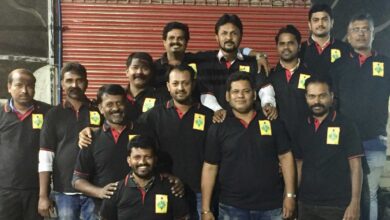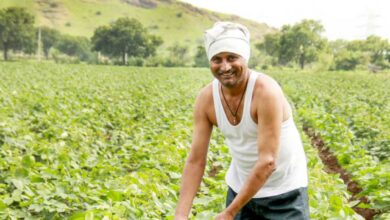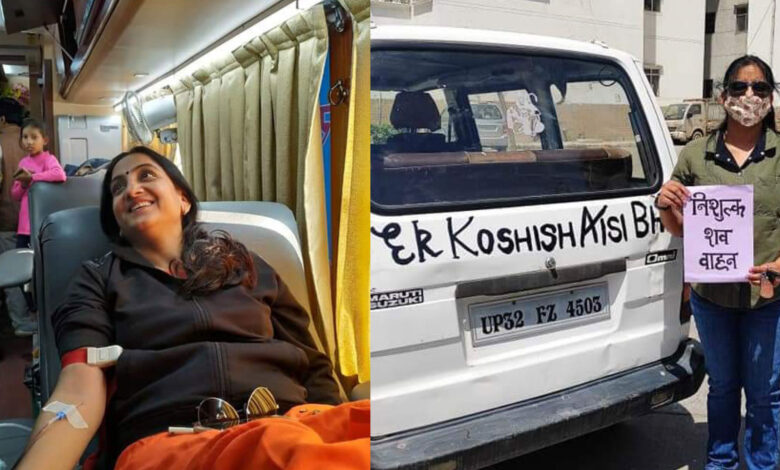
Datta. Dayadhvam. Damyata. Shantih shantih shantih – T.S. Eliot in ‘The Waste Land’
Bringing to you a story that’s a beautiful illustration of the same. Versha Verma is a woman who is a specimen of womanhood in all respects. She is irked with each statement that begins with-‘being a female…’ “because it is not who is going to let her, it is who is going to stop her” that makes her thrive. There’s sensitivity and stoic endurance, vulnerability and spiritual strength, tenderness, and courage, all in a beautiful blend!
Q. You are the founder of the organization “Ek Koshish Aisi Bhi”. What was the motivation behind it?
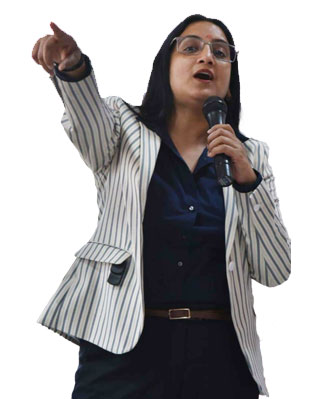
Whenever I would see some poor, needy people in despair, I would spend my nights tossing on my bed. I wondered why were they subjected to so much pain in their life and how could I bring them emotional comfort. Little efforts began and I grew from strength to strength spurred by this humanitarian instinct to help in whatever way I could. I have silently imbibed this instinct to give back to society, from my family, since my childhood. I began providing service to suffering humanity in more than one way and as the need of the hour arose to give it a shape and a name, I shaped it into an organization and named it ‘Ek Koshish Aisi Bhi’. It’s all about making efforts in the right direction, the firm belief being, ’when you make efforts, miracles happen.’
Q. What services does your organization provide? Who exactly does your organization help?
Our tagline says, ‘Connect with us for any genuine service required.’ A few of the services we provide are: • Free ambulance service and free ‘moksha vahini’ service. I ferry dead bodies to cremation grounds for free and cremate them.
• People who have lost their businesses, have become prone to depression, and have suicidal thoughts, are helped through small-scale employment opportunities.
• We conduct blood camps at regular intervals through which blood requirement in many hospitals is fulfilled.
• Elderly people from old age homes directly call us for their requirements of little things like spectacles and shoes to things like eye operations etc. We provide them with free medical aid.
• There are elderly couples who cannot cook for themselves or do their daily chores. We help them with grocery items and chores.
• Every Tuesday, sessions are conducted to create awareness among women (Especially rural women) about hygiene issues.
• Cancer is a deadly disease that makes people sell their houses, shops, and property to bear the expenditure of the treatment. Caretakers suffer from burnout. We take care of the caretakers by providing them with emotional support as well as weekly free rations.
• We provide all genuine services but we do cross-check the requirement and accordingly provide help.
The kind of gambit Kathak provides in its presentation, understanding and depth is serene, ennobling, and surreal.
Q. Imagining a woman cremating unclaimed bodies jars our sensibility and conditioning. How did this happen?
Any social practice that has gone stale and needs to change, must be changed. Women were considered to be soft-hearted and hence were not supposed to go to the funeral ground but I have the conviction that a woman has the strength that nobody in the entire universe has. I don’t approve of any statement that begins with the words, ‘being a female…’. If you are a whistleblower and are passionate, no gender bias can hinder your growth.
Q. How do you feel about it? How do people take it, especially, the relatives of the deceased?
The feelings you have while worshipping God is the feeling I have when I am helping an utter stranger. Unclaimed bodies are my God, giving them a shoulder is my emancipation, and doing their funeral rites is my prayer. I agree what I do is very different but I believe people begin to appreciate what you do when you do it with full sanctity
Q. What were the challenges during the pandemic? Did you get any support from the government institutions?
When the second wave of the pandemic had the world in its jaws, our services were at their peak. Different news channels were approaching us to cover the funeral services we were rendering. BBC covered us and our service numbers went viral. People who were living abroad and could not come home due to the lockdowns, connected to us pleading to provide cremation to their beloved family members, and we religiously did. This was certainly the biggest responsibility as children on their shoulders that they entrusted upon ours.
Q. What are the lessons learned?
‘Live every moment like it was the last.’ The second wave of the pandemic has taught us lessons of life the hardest way and we have no right to be called humans if we still don’t mend our ways. We have also learnt that health is the most precious wealth. We are not here forever. We better live life to the fullest and with love.
Q. The number of old age homes in India is rapidly increasing. Throw some light on the equation, please. What is your message as a social activist for both generations?
As they say, ‘as you sow, so shall you reap.’ If we are helping increase the number of old age homes, we might have to spend our old age in the same old age homes. We should therefore be nursing our parents with the same gentle care that they brought us up with. It is a serious issue. There are many reasons behind this scenario. The fault does not solely lie with the young generation. It is the most coveted and the most suppressed dream of the old generation that it aspires to fulfil through the next generation i.e., studying or working abroad.
The old generation spends its entire savings in pursuit of the dream to send their children abroad who then settle there. Who sowed the seed? Parents. Who suffered in the end? Parents. We should set goals around our family requirements and respect our value system rather than emulate western culture blindly.
Q. Domestic violence in India is rife. Why is the matter still brushed under the carpet? Does your organization provide any help?
A few lines might not sum it up. Not only domestic violence but also violence at work is a big challenge for women. Ambitious women often get subjected to physical and emotional exploitation. They must be empowered to say ‘no’. There are many other reasons why domestic violence is rife. Our organization is not legally equipped to solve such problems but we do provide helpline numbers. We educate them on the legal counselling help available and the free lawyer services in such cases.
Q. Is work-life balance a challenge to you?
My family is my strength and my work is my worship. I try to strike a work life balance. I believe I can ward my family off the evil eye by doing good deeds for others.
Q. What are the provisions in the field of education, specifically, for underprivileged children? are the provisions in the field of education, specifically, for underprivileged children?
We provide the entire school fee and related facilities to the students who are brilliant and would like to study further. We adopted eleven children with the entire expenditure to be borne by us, a number that has reached eighteen posts the pandemic.
Q. What has been the proudest moment of your life?
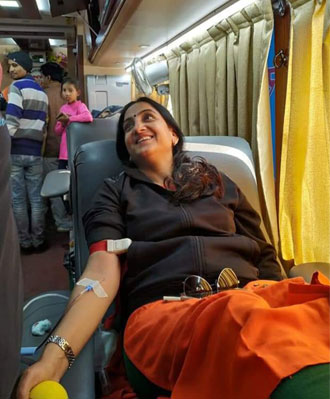
The moment I had taken the pledge that nobody in my city will ever be an unclaimed burden and my shoulders will be their stay, was the proudest moment of my life. When my father’s chest inflates with pride and my mother’s eyes moisten the same, these are the most precious moments for me. I would consider my life worthwhile when I can continue making my parents proud of me.
Q. What support does your life partner bring? Does he, have any?
My marriage has been an arranged marriage but it beats even the Heer Ranjha love story. I am often asked how my husband supports me in the work I do, I tell them I wrote my wedding invites in different rooms of different hospitals. I chose a government hospital in the city to go on a date with my fiancé. As a substitute for fun and adventure, I have run errands for patients bringing them juice and medicines, pressing their tired limbs, collecting medical reports, and waiting outside the OTs. What do I say about the man who still fell in love with me? Isn’t it a pattern of love more sublime than any other? I feel I am God’s favourite to have found a life partner like Mr. Verma.
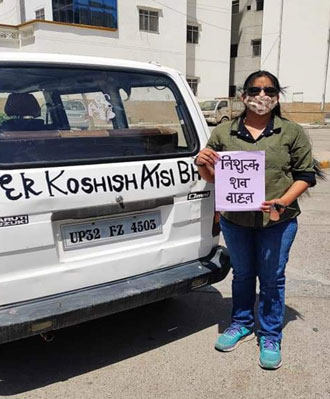
Versha Verma is a well-known author too. Kindly tell us about your achievements as an author.
At times, reasons are painful, no matter how lofty we go. I became friends with pen due to a personal tragedy. My pain got in the form of a poetry book titled ‘Shabd mere kavita tare naam ki’. Besides that, there are two coffee table books designed exclusively by me. There are stories fluttering in my mind’s galleria, the collection of which, will soon see the light of day.
Q. You have achieved prestigious awards for your humanitarian work. Which has been the biggest award so far?
My biggest award is your trust. It is the trust with which a person in need calls me up. My biggest award is the moment when I have accomplished the task expected. I pray to God that this trust remains intact and it keeps me going. A woman once commented on my hands saying they were so coarse. I felt hurt but then I realized soon that my coarse hands were much better than those beautiful hands that had never been in service to the needy.
God puts you through tough times when you take a pledge to serve humanity. There will be people who would fail to appreciate and understand your goals. There will be people who will discourage you, and dissuade you from the path of service. Try to find some good, some challenges, some positivity even there and move ahead. Be unstoppable!


